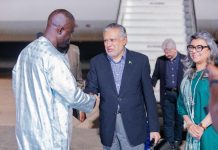ISLAMABAD July 15 (TNS): In case of no-confidence motion: PM will have support of more than 240 MNAs, the PML-N sources have revealed.
In the backdrop of the JIT report in Panama Leaks, the opposition is exerting pressure on the Prime Minister to resign and may also try to move a no confidence motion against him as a last resort because Mr. Nawaz Sharif has made it clear that his conscience is clear and would not resign.
In the 342-member National Assembly, Pakistan Muslim League-Nawaz (PML-N) enjoys the majority with 218 Members National Assembly (MNAs) including its coalition partners, and Prime Minister is likely to get the support of more than 200 members if he faces no-confidence motion.
The aforementioned move against the premier needs at least votes of 175 MNAs to get successful. There are 189 members of PML-N in the National Assembly, 13 of Jamiat Ulema Islam-Fazl (JUI-F), 5 of Pakistan Muslim League (Functional), 3 of Pakhtunkhwa Milli Awami Party (PkMAP), 2 of National Peoples Party, 1 apiece of Pakistan Muslim League (Zia) and National Party, and four independent members, which take PML-N’s tally to 218.
On the other hand, 88 members of opposition seem united against PM including 47 MNAs of Pakistan People’s Party (PPP). Furthermore, it is before time to comment on the alliances of Mutt ahida Qaumi Movement (MQM), Awami National Party (ANP), Balochistan National Party, Qaumi Watan Party (QWP), All Pakistan Muslim League (APML) and one independent member.
According to PML-N sources, if Nawaz Sharif faces no-confidence motion, he will be supported by more than 240 members. On the contrary, President Awami Muslim League (AML) Sheikh Rasheed Ahmed has claimed that there is a forward block of 44 members in PML-N, and Senator Sardar Zulfiqar Khan Khosa has asserted that the forward block includes 92 MNAs of PML-N.
As per the Constitution of Pakistan, those members will be disqualified who vote against their respective party policies in the no-confidence motion. Therefore, the displeased members of any party will prefer to remain absent during the voting.













